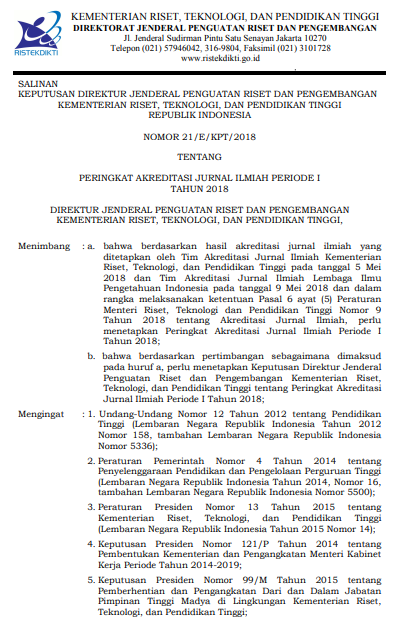The Legal Impacts of The Convention for The Conservation of Southern Bluefin Tuna on The Optimum Utilization and Sustainability of Highly Migratory Fish
Abstract
The sustainability of southern Bluefin tuna (SBT) is very important, since the SBT as one of the highly migratory fish which is very valuable. Because of that, the SBT are exploited tremendously and it caused serious decline of the population. Due to the reasons, the aim of the paper is to examine comprehensively the legal impacts of the Convention for The Conservation of Southern Bluefin Tuna (CCSBT) on the optimum utilization and sustainability of the SBT as one of highly migratory fish, There are two problems questions that are proposed, namely, first, how is the role of the Commission of CCSBT in the optimum utilization and sustainable conservation of the SBT. Second, how is the legal impacts of the CCSBT to the conduct of the Member States to obey the obligations of the CCSBT in order to utilize and to maintain the sustainability of the SBT in sustainable manner. The result of the paper finds that there is positive legal impacts of the CCSBT to the Member States’ conduct in order to materialize the optimum utilization and sustainability of the SBT, though, there are still some challenges.
Keywords: conservation, highly migratory fish, optimum utilization, southern tuna Bluefin, sustainable manner.Southern Bluefin Tuna (SBT), as one of the highly migratory fish, is very valuable due to the high demand inthe international market. Hence, the SBT is exploited tremendously and it caused a severe decline in thepopulation. To maintain the sustainability utilization of SBT, the role of the Commission on the CCSBT isimperative. The objective of the research is to examine conceptually the legal impacts of the Convention forthe Conservation of Southern Bluefin Tuna (CCSBT) on the optimum utilization and sustainability of the SBT.It is a normative juridical research by applying conceptual and statutory approaches. The results of theresearch indicates that: first, the role of the Commission of CCSBT in the optimum utilization and thesustainability of the SBT is very significant: second, there are positive legal impacts of the CCSBT to theconduct of the Member States to comply with provisions of the CCSBT; third, the legal impacts of CCSBT areable to oblige the Member States to perform their obligations, however, there are still some challenges tomaterialize the objective of the CCSBT.Keywords: conservation; highly migratory fish; optimum utilization; southern tuna bluefin; sustainability.
Full Text:
PDF View
References
Ardron Jeff. Et.all. (2014). Tracking Twenty-Four Years of Discussions About Transparency In International Marine Governance: Where Do We Stand? Stanford Environmental Law Journal. 33. 167-189.
Boon Kristen E. (2013). Overfishing of Bluefin Tuna: Incentivizing Inclusive Solutions. University of Louisville Law Review. 52. 1 -38.
Brooks Cassandra M. et.all. (July, 2014). Challenging the ‘Right to Fish’ in a Fast-Changing Ocean. Stanford Environmental Law Journal. 33. 289-324.
Doremus Holly. (Spring, 2013). Why International Catch Shares Won’t Save Ocean Biodiversity. Michigan Journal of Environmental & Administrative Law. 2 385-428.
Edith Brown Weiss, “In Fairness to Future Generations International Law, Common Patrimony, and Intergenerational Equity”. Retrieved May 23, 2019, from https://philpapers.org/rec/WEIIFT.
Erickson. Ashley Lillian. (Fall, 2008). Out of Stock: Strengthening International Fishery Regulations to Achieve A Healthier Ocean. North Carolina Journal of International Law and Commercial Regulation. 34. 281-323
FAO. Origin of the Convention of the Conservation of Southern Bluefin Tuna. Retrieved on 24 December 2019. https://www.ccsbt.org/en/content/origins-convention.
FAO. (2020). UN Fish Stock Agreement. Retrieved December 23, 2018, from http://www.fao.org/iuu-fishing/international-framework/un-fish-stocks-agreement/en/
Frink Russell. 2013. Preserving Trans-Boundary Aquifers: A Precious Resource For Our Future Generation. Pacific Mc George Global Business & Development Law Journal. 26 .503-530.
Futerman Andrew. (Spring, 2018). At The Intersection of Science & Policy: International Shark Conservation & Management. Duke Environmental Law and Policy Forum.28. 259 -306>
Golitsyn Vladimir. (2017). Freedom of Navigation: Development of The Law Of The Sea And Emerging Challenges. International Law Studies. 93. 262-271.
Hagan Sean A. (Winter, 2014). Too Big To Tackle? The Persistent Problem Of Pirate Fishing And The New Focus On Port State Measures. 37. 109-133.
Hagan Sean A. (Winter, 2014). Too Big To Tackle? The Persistent Problem Of Pirate Fishing And The New Focus On Port State Measures. 37. 109-133. Retrieved December 27 ,2019, from https://www.ccsbt.org/en/content/origins-convention
Kadens Emily and Ernest A. Young. (February, 2013). How Customary Is Customary International Law? William and Mary Law Review. 54. 885-920.
Kato Dawn M. (Fall, 2011). Battle For Bluefin: The Consumer’s Role in Preserving the Atlantic Bluefin Tuna, California Western International Law Journal, 42. 149-188.
Klein Natalie. (2011). From Eco-Terrorism to Eco-Tourism: Assessing Effective Regulatory Tools and Regimes in Marine Management. Chinese (Taiwan) Yearbook of International Law and Affairs. 29. 123-134
Korman Seth. (Spring, 2011). International Management of A High Seas Fishery: Political and Property-Rights Solutions and the Atlantic Bluefin. Virginia Journal of International Law. 51. 697-748
Krajewsk M Jason. ( 2008). Out of Sight, Out of Mind? A Case for Long Range Identification And Tracking of Vessels on the High. Seas Naval Law Review. 56. 219-249
Lubin Asaf . (Winter, 2018). The Dragon-Kings’ Restraint: Proposing A Compromise For The Eez Surveillance Conundrum. Washburn Law Journal. 57. 17-75.
Orellana Marcos A. (Spring, 2004). The Law on Highly Migratory Fish Stocks: ITLOS . Jurisprudence In Context. Golden Gate University Law Review. 34. 459-495.
Andrew Serdy, (2011). Postmodern International Fisheries Law, Or We Are All Coastal States Now. International & Comparative Law Quarterly. 60. 387-422.
Telesca Thomas A. (Fall, 2003). Sovereignty or The Precautionary Principle: Which Will Save Our Fish?. Southeastern Environmental Law Journal. 12. 23-72
Pavone Ilja Richard. (July, 2019). Is Banning Enough? The Intricacy Inherent To Marine Mammal Conservation. German Law Journal. 20 (590, 591), 587-613.
Roben Allen, (2010), International Management of Tuna Fisheries Arrangements, Challenges and a Way Forward, Food and Agriculture Organization of the United Nations. Rome. 7. Retrieved December 15, 2019, from http://www.fao.org/3/i1453e/i1453e00.pdf.
Sandra Dorning , (2008) From Voluntary to Monitored: The Development of The Commission
Secretary of the CCSBT, Strategic Plan for the Commission for the Conservation of Southern Bluefin Tuna 2015 - 2020
Serdy Andrew. (2010). Accounting For Catch In Internationally Managed Fisheries: What Role For State Responsibility? Ocean and Coastal Law Journal. 15. 23-84.
Telesetsky Anastasia. (Summer, 2015). Scuttling IUU Fishing and Rewarding Sustainable Fishing: Enhancing the Effectiveness of the Port State Measures Agreement With Trade-Related Measures. Seattle University Law Review. 38. 1237-1270
Tom Polacheck Campbell Davies , (2008), “Considerations of the Implications of Large Unreported Catches of Southern Bluefin Tuna for Assessments of Tropical Tunas, and the Need for Independent Verification of Catch and Effort Statistics “, p.3. (1-22). Retrieved January 3, 2019, from http://www.cmar.csiro.au/e-print/open/2008/polacheckt_a.pdf
Vignocchi Clayton. (Summer 2015). ITLOST? The International Tribunal For The Law Of The Sea Sounds The Charge To Expand Coastal State Jurisdiction. Tulane Maritime Law Journal. 39. 791-803.
Wassman, J., & Dasen, P.R. (1998). Balinese spatial orientation. Journal of Royal Anthropological Institute. 4. 689-731.
Wilson Brian, ( July, 2010). An Avoidable Maritime Conflict: Disputes Regarding Military Activities In The Exclusive Economic Zone. Journal of Maritime Law and Commerce. 41. 421-437.
Wold Chris. (Winter, 2019). The Impracticability Exemption To The WCPFC’s Prohibition on Transhipment on The High Seas. Environmental Law. 49. 131-186.
Wold Chris. (Winter, 2019). The Impracticability Exemption To The Wcpfc’s Prohibition On Transhipment On The High Seas . Environmental Law. 49. 131-186
Young Margaret A. (Summer, 2019). International Adjudication and the Commons. University of Hawaii Law Review. 41. (353-382.
DOI: http://dx.doi.org/10.20884/1.jdh.2019.19.3.2596
Refbacks
- There are currently no refbacks.
JURNAL DINAMIKA HUKUM Indexed by :
 | Jurnal Dinamika Hukum | |
| Faculty of Law, Universitas Jenderal Soedirman | Copyright of Jurnal Dinamika Hukum | |
| Yustisia IV Building, Law Journal Center | ISSN 2407-6562 (Online) ISSN 1410-0797 (Print) | |
| Purwokerto, Central Java, Indonesia, 53122 | JDH is licensed under a Creative Commons Attribution 4.0 International License | |






